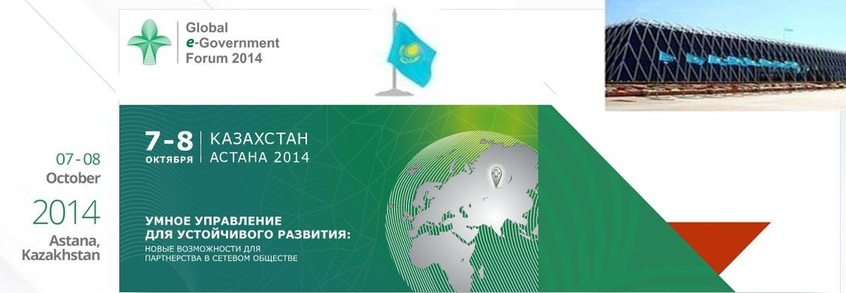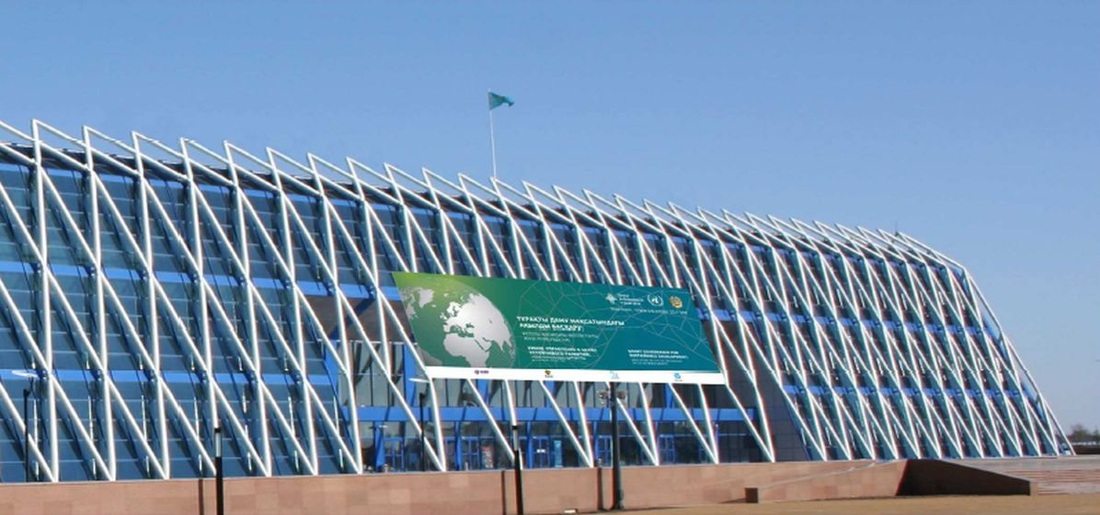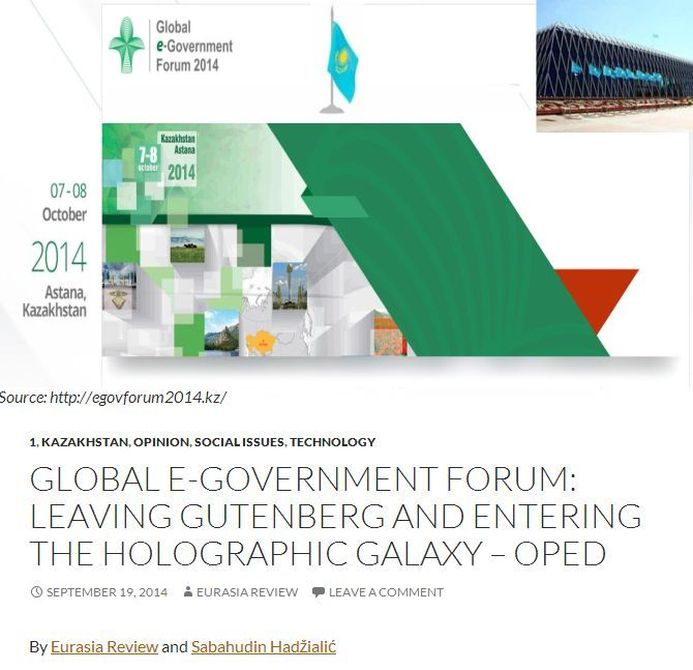|
NA LISTI Od 04.8.2010.g. /
LISTED SINCE August 4th, 2010 among leading European magazines: |
All Rights Reserved
Publishers online and owners: Peter Tase and Sabahudin Hadžialić, Whitefish Bay, WI, United States of America MI OBJEDINJUJEMO RAZLIČITOSTI... WE ARE UNIFYING DIVERSITIES |
VENUE - FORUM
Independence Palace, Tauelsizdik Avenue, 52., Astana, Kazakhstan
19.9.2014
By Eurasia Review - Sabahudin Hadžialić
Global E-Government Forum:
Leaving Gutenberg and entering the Holographic galaxy
XXI century Global E-Government Forum in the city of XXII century - Astana, Kazakhstan, The E-World capital in 2014
Where is the best place to hold the Global E-Government Forum than in a country with 138 nations and the 30 most popular religions, as well as many language groups??
Where is the best place to hold the Global E-Government Forum than in the country where the unemployment rate is only just a few percent and even those few percent consists of recent graduates who have just started looking for jobs??
Where is the best place to hold the E-Government Forum than in the country which ranks among the top 30 most powerful countries in the level of ‘E-Government’ development?
But, the most important procedural question rises beyond the ones mentioned: Why do we need E-Government? Furthermore, why have E-Government issues not been more developed to assure the further dissemination of the information that goes towards the betterment of human well-being during the age of the Holographic galaxy which we are experiencing since the establishment of the Virtual world?
The Answer is simple, yet it is hard to get it to materialize on the surface of thoughts and decision making. Namely, in these times when the individual is more than ever alienated with the means of technological revolution, when we have our iPods, iPhones and all kinds of mobile phone devices with us everywhere (not to mention places where we have used newspapers and books before and even had places for them there – you know: the places where we, besides other things, shave our faces), E-Government is the best solution for the proper dissemination of information with feedback for adequate decision-making processes.
But, let’s start with a few historical facts: Since 2012, the Republic of Korea in collaboration with the UN Department of Economic and Social Affairs, organized two Global E – government Forums. The first Forum in 2012 was focused on “Smart government for the better future”. The second Forum was held in 2013 under the topic “Smart Government and Smart Society: Openness, Sharing, Communication and Collaboration“, and in this occasion it was decided that the next Forum would be held in Astana, Kazakhstan, from 6 to 8 October 2014.
The topic of this year’s E-government Forum is “Smart Governance for Sustainable Development: New Opportunities of Partnership in the Network Society” and will be held in Astana, Kazakhstan on October 7 – 8, 2014. As announced, more than 700 key officials from relevant governmental organizations, world experts and academicians from more than 70 countries, including media coverage from the worldwide newspapers and journals, such as Eurasia Review, from which its Senior Partner from Bosnia and Herzegovina, the author of this introduction to the World of E-Government, will participate as well, in this global event, through exchanging his opinions and proposing solutions with one goal: to make this highly divided and heavily demolished world a better place to live. Why we are underlining the part of the previous sentence. Why wouldn’t we? Because, 1.2 billion people live in extreme poverty worldwide – on less than US$1.25 a day and more than 840 million people continue to struggle with hunger every day. How can this E-Government Forum help reduce the above challenges.
Easily?!
Through these networking events among nations, using information to the benefit of all instead of the abusing of a few, through the creation of Government for all based on real democratic means that came from Agora centuries ago, but this time with the most fluctuating means of communication: social networks. The name is ‘social,’ and the social is the society that makes Government efficient and responsible, eo ipso communication networking within E-Government through the use, not abuse, of social networks that serve to help. Whom? All of us, regardless if we are sitting in the comfortable Minister’s Chair or selling the tickets in the suburban bus. How? Via the exchange of information, dissemination of methodologically based conclusions, analysis of expectations and, finally, even, changes in ultimate decisions. Democracy should mean the acceptance of alternative thoughts, if they are used properly.
The speakers of this year’s Forum will be from Bahrain, India, South Korea, the Russian Federation, United Kingdom, Canada, the Netherlands, Switzerland, Romania and Italy.
As part of the Global E-government Forum there will be an exhibition, which will introduce the information technology system of government bodies in the Republic of Kazakhstan.
The Forum is organized by the UN E-Government Branch of the Division for Public Administration and Development Management (DPADM) of the Department of Economic and Social Affairs (DESA), and in partnership with the Agency for Communication and Information of the Republic of Kazakhstan.
As stated in the AIDE-MEMOIRE:
The United Nations Department of Economic and Social Affairs (UNDESA), through its Division for Public Administration and Development Management (DPADM), assists Member States in promoting efficient, effective, transparent, accountable, collaborative and citizen centered public governance, administration and services through innovation and technology to achieve the internationally agreed development goals. UNDESA promotes knowledge sharing of innovative approaches and practices in public management, as well as capacity development in the area of innovation and e-government. The General Assembly itself has highlighted the importance of knowledge-sharing activities in resolution 57/277, noting that particular emphasis should be given to the exchange of experience related to the role of public administration in the implementation of internationally agreed goals, including those contained in the Millennium Declaration. In resolution 50/225, it also underscored that international cooperation should be strengthened in the field of public administration, including South-South and Inter-Regional cooperation.
The ultimate goal of this forum is to enhance government capacity, particularly in developing countries, through presentations, discussions, and peer-to-peer learning. The main objectives include:
· To discuss policies, strategies and best practices for smart government and smart society
· To present recent trends of e-Government development and introduce new approaches as applied in the 2014 UN e-Government Survey
· To introduce various country cases of Smart Governance from around the globe and assist Member States to promote cooperation in this area
· To strengthen North-South and South-South cooperation for the development of Smart Government
The Forum is expected to achieve the following outputs:
· Identify good case studies that highlight smart governance and smart society that could be shared at the Rio +20 Global Summit
· Obtain greater knowledge of Central Asian’s e-government activities and progress made, as well as develop stronger ties between DESA and the region
· Draw recommendations and suggestions from the Forum discussions in order to provide guidance to Member States on how to promote smart government and smart society
· Renewed commitment among policy makers to adapt their acquired knowledge and expertise in developing innovative e-Government strategies fit for their countries
Within the framework of the overall theme of the Forum ‘Smart Governance for Sustainable Development: New Opportunities for Partnership in the Networking Society”, four interrelated sub-themes will be discussed in the workshop in order to enhance public administration capacity as follows:
1. Trends and Emerging Issues of Smart Government and Smart Societies
2. Strategic Policy-Making Aspects of Implementing Smart Government
3. Whole-of-Government Approach
4. Open Government
Eurasia Review will be presented by its senior partner, Sabahudin Hadžialić, M.S. and provide coverage of the event, as well as the outcomes of the E-Government Forum in Kazakhstan.
Gutenberg is behind us. Welcome to the Holographic Society.
Starting from E-Government Forum at the Independence Palace of Astana, Kazakhstan; at least.
By Eurasia Review - Sabahudin Hadžialić
Global E-Government Forum:
Leaving Gutenberg and entering the Holographic galaxy
XXI century Global E-Government Forum in the city of XXII century - Astana, Kazakhstan, The E-World capital in 2014
Where is the best place to hold the Global E-Government Forum than in a country with 138 nations and the 30 most popular religions, as well as many language groups??
Where is the best place to hold the Global E-Government Forum than in the country where the unemployment rate is only just a few percent and even those few percent consists of recent graduates who have just started looking for jobs??
Where is the best place to hold the E-Government Forum than in the country which ranks among the top 30 most powerful countries in the level of ‘E-Government’ development?
But, the most important procedural question rises beyond the ones mentioned: Why do we need E-Government? Furthermore, why have E-Government issues not been more developed to assure the further dissemination of the information that goes towards the betterment of human well-being during the age of the Holographic galaxy which we are experiencing since the establishment of the Virtual world?
The Answer is simple, yet it is hard to get it to materialize on the surface of thoughts and decision making. Namely, in these times when the individual is more than ever alienated with the means of technological revolution, when we have our iPods, iPhones and all kinds of mobile phone devices with us everywhere (not to mention places where we have used newspapers and books before and even had places for them there – you know: the places where we, besides other things, shave our faces), E-Government is the best solution for the proper dissemination of information with feedback for adequate decision-making processes.
But, let’s start with a few historical facts: Since 2012, the Republic of Korea in collaboration with the UN Department of Economic and Social Affairs, organized two Global E – government Forums. The first Forum in 2012 was focused on “Smart government for the better future”. The second Forum was held in 2013 under the topic “Smart Government and Smart Society: Openness, Sharing, Communication and Collaboration“, and in this occasion it was decided that the next Forum would be held in Astana, Kazakhstan, from 6 to 8 October 2014.
The topic of this year’s E-government Forum is “Smart Governance for Sustainable Development: New Opportunities of Partnership in the Network Society” and will be held in Astana, Kazakhstan on October 7 – 8, 2014. As announced, more than 700 key officials from relevant governmental organizations, world experts and academicians from more than 70 countries, including media coverage from the worldwide newspapers and journals, such as Eurasia Review, from which its Senior Partner from Bosnia and Herzegovina, the author of this introduction to the World of E-Government, will participate as well, in this global event, through exchanging his opinions and proposing solutions with one goal: to make this highly divided and heavily demolished world a better place to live. Why we are underlining the part of the previous sentence. Why wouldn’t we? Because, 1.2 billion people live in extreme poverty worldwide – on less than US$1.25 a day and more than 840 million people continue to struggle with hunger every day. How can this E-Government Forum help reduce the above challenges.
Easily?!
Through these networking events among nations, using information to the benefit of all instead of the abusing of a few, through the creation of Government for all based on real democratic means that came from Agora centuries ago, but this time with the most fluctuating means of communication: social networks. The name is ‘social,’ and the social is the society that makes Government efficient and responsible, eo ipso communication networking within E-Government through the use, not abuse, of social networks that serve to help. Whom? All of us, regardless if we are sitting in the comfortable Minister’s Chair or selling the tickets in the suburban bus. How? Via the exchange of information, dissemination of methodologically based conclusions, analysis of expectations and, finally, even, changes in ultimate decisions. Democracy should mean the acceptance of alternative thoughts, if they are used properly.
The speakers of this year’s Forum will be from Bahrain, India, South Korea, the Russian Federation, United Kingdom, Canada, the Netherlands, Switzerland, Romania and Italy.
As part of the Global E-government Forum there will be an exhibition, which will introduce the information technology system of government bodies in the Republic of Kazakhstan.
The Forum is organized by the UN E-Government Branch of the Division for Public Administration and Development Management (DPADM) of the Department of Economic and Social Affairs (DESA), and in partnership with the Agency for Communication and Information of the Republic of Kazakhstan.
As stated in the AIDE-MEMOIRE:
The United Nations Department of Economic and Social Affairs (UNDESA), through its Division for Public Administration and Development Management (DPADM), assists Member States in promoting efficient, effective, transparent, accountable, collaborative and citizen centered public governance, administration and services through innovation and technology to achieve the internationally agreed development goals. UNDESA promotes knowledge sharing of innovative approaches and practices in public management, as well as capacity development in the area of innovation and e-government. The General Assembly itself has highlighted the importance of knowledge-sharing activities in resolution 57/277, noting that particular emphasis should be given to the exchange of experience related to the role of public administration in the implementation of internationally agreed goals, including those contained in the Millennium Declaration. In resolution 50/225, it also underscored that international cooperation should be strengthened in the field of public administration, including South-South and Inter-Regional cooperation.
The ultimate goal of this forum is to enhance government capacity, particularly in developing countries, through presentations, discussions, and peer-to-peer learning. The main objectives include:
· To discuss policies, strategies and best practices for smart government and smart society
· To present recent trends of e-Government development and introduce new approaches as applied in the 2014 UN e-Government Survey
· To introduce various country cases of Smart Governance from around the globe and assist Member States to promote cooperation in this area
· To strengthen North-South and South-South cooperation for the development of Smart Government
The Forum is expected to achieve the following outputs:
· Identify good case studies that highlight smart governance and smart society that could be shared at the Rio +20 Global Summit
· Obtain greater knowledge of Central Asian’s e-government activities and progress made, as well as develop stronger ties between DESA and the region
· Draw recommendations and suggestions from the Forum discussions in order to provide guidance to Member States on how to promote smart government and smart society
· Renewed commitment among policy makers to adapt their acquired knowledge and expertise in developing innovative e-Government strategies fit for their countries
Within the framework of the overall theme of the Forum ‘Smart Governance for Sustainable Development: New Opportunities for Partnership in the Networking Society”, four interrelated sub-themes will be discussed in the workshop in order to enhance public administration capacity as follows:
1. Trends and Emerging Issues of Smart Government and Smart Societies
2. Strategic Policy-Making Aspects of Implementing Smart Government
3. Whole-of-Government Approach
4. Open Government
Eurasia Review will be presented by its senior partner, Sabahudin Hadžialić, M.S. and provide coverage of the event, as well as the outcomes of the E-Government Forum in Kazakhstan.
Gutenberg is behind us. Welcome to the Holographic Society.
Starting from E-Government Forum at the Independence Palace of Astana, Kazakhstan; at least.
DIOGEN pro culture magazine provides you the direct link to view:
|
| ||||||||||||
Agenda
Live stream of the event
|
The Independence Palace in Astana is the venue for official state events, forums, conferences, meetings, congresses. Capacity of premises, technical equipment and comfort allow covering all the events at the highest international level. The internal device represents an amazing combination of simple solutions which offers comfort with aesthetics.
|
The structure of the Independence Palace is:
- Congress Hall;- Ceremonial Hall; - Press- center; - Gallery of Applied Art and Ethnography, Archeology and Anthropology; - Gallery of Modern Art; - Museum of the History of Astana; - 4D Cinema; - 360 degrees Cinema - Electronic Library;- Model Hall. |
|
|
|
Next article on Global E-Government Forum, Astana Kazakhstan, 2014
.

Copyright © 2014 Peter Tase & Sabahudin Hadžialić
Design: Sabi / Autors & Sabahudin Hadžialić. Design LOGO - Stevo Basara.
Freelance gl. i odg. urednik od / Freelance Editor in chief as of 2009: Sabahudin Hadžialić
All Rights Reserved. Publishers online and owners: Peter Tase & Sabahudin Hadžialić
Whitefish Bay, WI, United States of America
Contact Editorial board E-mail: [email protected];
Narudžbe/Order: http://www.diogenpro.com/diogen-all-in-one.html
Pošta/Mail USA: Peter Tase, 5023 NORTH BERKELEY BLVD. WHITEFISH BAY, WI, 53217, USA
Pošta/Mail BiH:Sabahudin Hadžialić, Grbavička 32, 71000 Sarajevo i/ili Dr. Wagner 18/II, 70230 Bugojno,
Bosna i Hercegovina
Design: Sabi / Autors & Sabahudin Hadžialić. Design LOGO - Stevo Basara.
Freelance gl. i odg. urednik od / Freelance Editor in chief as of 2009: Sabahudin Hadžialić
All Rights Reserved. Publishers online and owners: Peter Tase & Sabahudin Hadžialić
Whitefish Bay, WI, United States of America
Contact Editorial board E-mail: [email protected];
Narudžbe/Order: http://www.diogenpro.com/diogen-all-in-one.html
Pošta/Mail USA: Peter Tase, 5023 NORTH BERKELEY BLVD. WHITEFISH BAY, WI, 53217, USA
Pošta/Mail BiH:Sabahudin Hadžialić, Grbavička 32, 71000 Sarajevo i/ili Dr. Wagner 18/II, 70230 Bugojno,
Bosna i Hercegovina





